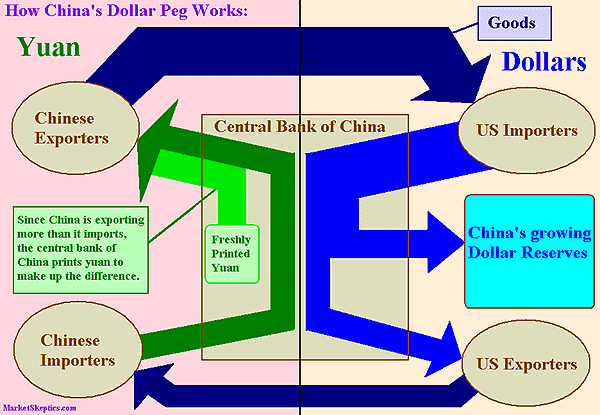An FT op-ed by the president of the Chinese Academy of International Trade and Economic Cooperation and the chairman of the Center for America-China Partnership, timed to the recent Strategic and Economic Dialogue in Beijing.
Nice summary of China's thinking regarding our bilateral economic relationship:
America is used to having it all its own way. In 1972, as the US opened diplomatic relations with China, it abandoned pegging the dollar to gold. That enabled it--through its monopoly on printing US dollars--to create huge trade and investment advantages. Its economy grew strongly as it managed the value of its currency at the expense of other nations.
Washington has not always fully acknowledged that from 2000, the year China joined the World Trade Organization, to 2008 the US dollar declined against many currencies, while from 2005 to 2008 Beijing gradually increased the US dollar exchange rate of the renminbi by 21 percent.
The US stimulus plan increased America's debt and deficits and will decrease the value of the dollar. China increased its holding of dollars as America's other trade partners reduced theirs. As the US financial crisis loomed, China pegged the renminbi to increase stability and exert a positive influence on its economic recovery. It will keep a relatively stable renminbi exchange rate to ensure its economic growth is steady rather than uncontrollable, which would harm all nations. Currently, China is providing stability as the largest holder of US government debt and US dollar-denominated reserves.
China-US relations changed when the world learnt that America's financial system would collapse unless the government saved insolvent US-based global banks, insurance companies and carmakers. The bail-out turned the US government into the largest shareholder of formerly privately-owned companies, subsidizing their commercial failure. Laissez faire theories, which US policymakers still demand that China adopt, were suddenly replaced by massive US government control of market forces.
The US often pursues policies that are "win-win" for itself alone. Its policymakers would undermine China's vital national security and economic interests while seeking China's help in protecting America's vital interests. But the reality is that the policies America proposed are implementable and sustainable only if they are beneficial also for China. The Strategic and Economic Dialogue should focus on new US policies instead of trying to change China's policies, which are essential for global economic recovery.
An excellent and hard-to-refute summary argument. Our success in encouraging China's rise is such that it can now legitimately claim to be working on behalf of global economic security as much or more than America. In short, it can make the claim that "what's good for China is good for the world," an argument to which only America could lay serious claim in past decades.
This is why we've never going to war with China; the codependency on globalization is profound.
